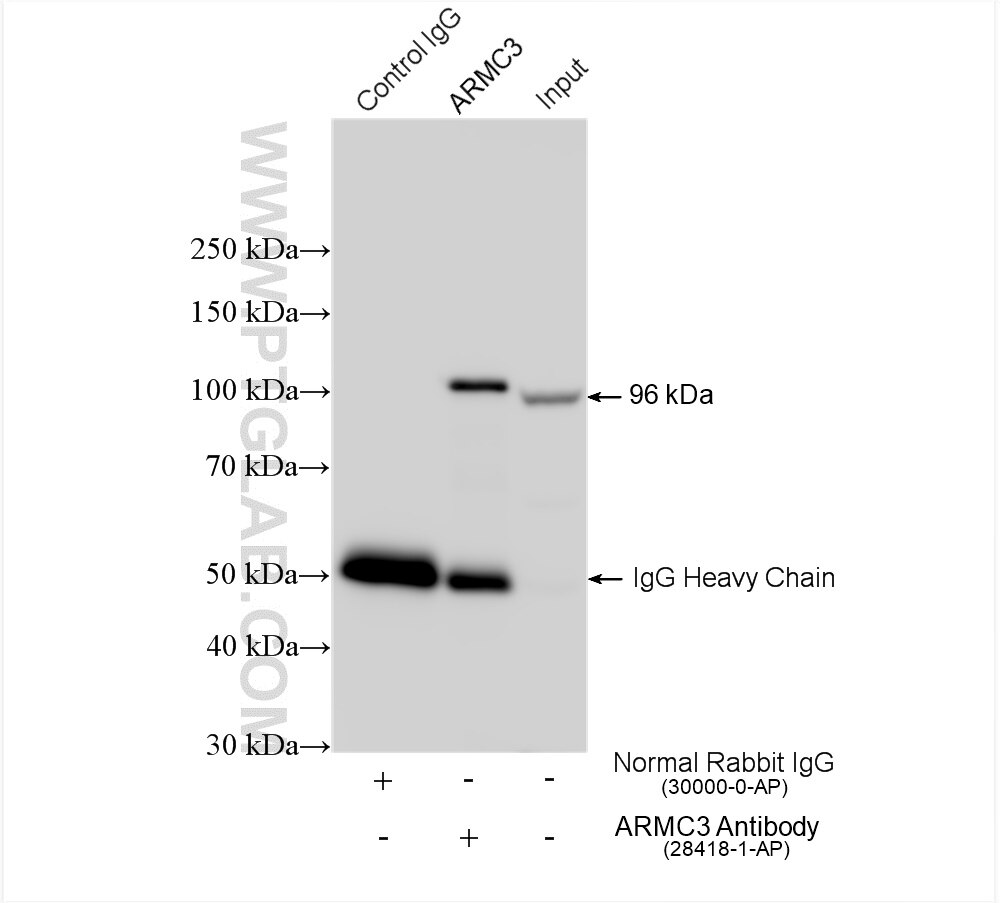ARMC3 Polyklonaler Antikörper
ARMC3 Polyklonal Antikörper für IP, ELISA
Wirt / Isotyp
Kaninchen / IgG
Getestete Reaktivität
human, Maus
Anwendung
IP, ELISA
Konjugation
Unkonjugiert
Kat-Nr. : 28418-1-AP
Synonyme
Galerie der Validierungsdaten
Geprüfte Anwendungen
| Erfolgreiche IP | Maushodengewebe |
Empfohlene Verdünnung
| Anwendung | Verdünnung |
|---|---|
| Immunpräzipitation (IP) | IP : 0.5-4.0 ug for 1.0-3.0 mg of total protein lysate |
| It is recommended that this reagent should be titrated in each testing system to obtain optimal results. | |
| Sample-dependent, check data in validation data gallery | |
Produktinformation
28418-1-AP bindet in IP, ELISA ARMC3 und zeigt Reaktivität mit human, Maus
| Getestete Reaktivität | human, Maus |
| Wirt / Isotyp | Kaninchen / IgG |
| Klonalität | Polyklonal |
| Typ | Antikörper |
| Immunogen | ARMC3 fusion protein Ag29268 |
| Vollständiger Name | armadillo repeat containing 3 |
| Berechnetes Molekulargewicht | 872 aa, 96 kDa |
| Beobachtetes Molekulargewicht | 96-100 kDa |
| GenBank-Zugangsnummer | BC039312 |
| Gene symbol | ARMC3 |
| Gene ID (NCBI) | 219681 |
| Konjugation | Unkonjugiert |
| Form | Liquid |
| Reinigungsmethode | Antigen-Affinitätsreinigung |
| Lagerungspuffer | PBS mit 0.02% Natriumazid und 50% Glycerin pH 7.3. |
| Lagerungsbedingungen | Bei -20°C lagern. Nach dem Versand ein Jahr lang stabil Aliquotieren ist bei -20oC Lagerung nicht notwendig. 20ul Größen enthalten 0,1% BSA. |
Hintergrundinformationen
ARMC3 (Armadillo Repeat Containing 3), also known as the βcatenin-like protein, belongs to the CT81 family and is located at 10p12.31. ARMC3 the mouse ortholog of Vac8. It is reported that ARMC3 is important for autophagic elimination of cytosolic ribosomes during spermiogenesis and thus provides energy for flagellar motility(PMID: 34428398). ARMC3 has been identified in many cancer tissues and is thought to play a role in tumor initiation and metastasis.
Protokolle
| Produktspezifische Protokolle | |
|---|---|
| IP protocol for ARMC3 antibody 28418-1-AP | Protokoll herunterladen |
| Standard-Protokolle | |
|---|---|
| Klicken Sie hier, um unsere Standardprotokolle anzuzeigen |


